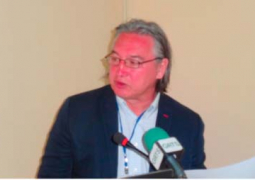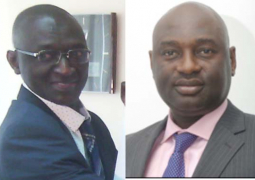
Lawyer
Ousainou Darboe, the jailed leader of the United Democratic Party (UDP) and 18
others, were yesterday granted bail by The Gambia Court of Appeal presided over
by Justice A.O. Adegoke, Justice Awa Bah and Justice Edrissa Mb’ai.
The
appellants were Ousainou Darboe, Kemeseng Jammeh, Femi Peters, Lamin Dibba,
Lamin Jatta, Yaya Bah, Babucarr Camara, Fakebba Colley, Ismaila Ceesay, Momodou
Fatty, Dodou Ceesay, Samba Kinteh, Momodou Manneh, Nfamara Kuyateh, Lamin Njie,
Yaya Jammeh, Momodou L.K. Sanneh, Massanneh Lalo Jawla, Fanta Darboe and
Junkuna Suso.
It
would be recalled that they were jailed for three years last July by the High
Court in Banjul, after they were convicted for unlawful assembly, holding a
procession without a permit, conspiracy, riot, among others.
The
matter was adjourned by the court, for proof of service and ordering of briefs.
When
the matter came up yesterday, defence lawyer Antouman A.B. Gaye, who led the
team of appellants, announced the members as A.N.D Bensouda, H.S. Sabally, S.M.
Tambadou, Omar M.N. Njie, R.Y. Mendy, Neneh M.C. Cham, Musa Batchilly, Abdoulie
Sisoho, Lamin S. Camara, Combeh Gaye, Anna Njie and Yassin Senghore.
He
informed the court that it was conspicuous that there was no one representing
the state at the court, and he then urged the court to stand down the matter
for about 15 minutes to enable the court call the representatives of the state.
Presiding
judge Justice A.O. Adegoke said in the interest of justice it was important to
hear from the state, adding that it was unusual that the state was not in
court.
Soon
after, DPP S.H. Barkum appeared for the state along with principal state
counsel Amichi Adeyemi, Antony Mendy and K. Mbaye.
The
DPP apologised to the court, stating that the state’s absence was not by
design, but due to reasons beyond their control.
Lawyer
Gaye then said the court had earlier made an order consolidating all the
appellants appeal, and the matter was adjourned for Monday 5 December for proof
of service and ordering of briefs.
He
further informed the court that the DPP had been served with the records.
Lawyer
Gaye said the issue regarding the matter of ordering of briefs should be put
aside, adding that the appellants have an application to make, and that the
appellants counsel has spoken to the DPP over the weekend about the
application.
Lawyer
Gaye added that the court should take judicial notice, that over the last few
days, there have been significant changes of circumstances in the country that
has affected the appellants.
The
fact is that on 1 December 2016 there was change of government in the country,
and the 1st applicant/appellant is the Secretary General of one of the parties
that form the coalition, he told the court.
“My
lord, I am not speaking on my own, but on instructions, and I wish to make an
oral application for our clients to be admitted to bail pending the
determination of the appeal, and there should not be any condition attached but
on self-recognizance.”
He
cited section 12 of the Gambia Court of Appeal Act, noting that the said
section allows the court to grant bail to appellants, and further referred the
court to section 7 of the Constitution, which lays down what constitutes the
common law and principle of equity.
He
submitted that now is the time to talk about the formal application, referring
the court to the offences alleged to have been committed by the
applicants/appellants as bailable.
Lawyer
Gaye said it has been 8 months since they were sentenced to imprisonment,
adding that there was no time to file any written application comprising of
affidavits and other things and waiting for the state to also file their
briefs.
“We
cannot bury our head in the sand, because this matter is a special
circumstance.”
Lawyer
Gaye then told the court that when he looked at the panel of judges, he saw the
bold spirit in them and not the timorous type, and proceeded to call on lawyer
A.N.D. Bensouda to make a formal application for bail on behalf of the 19
applicants/appellants.
DPP
S.H. Barkum in response told the court that he does have much to say, but that
he received a call from lawyer Bensouda over the weekend, at about 12.47 pm,
informing him of their intention to bring an oral application before the court,
seeking bail for the applicants.
“I
responded by saying that the practice in the court of appeal is always to
entertain bail application formally.
“My
position is that the bail application should be made formally, as has always
been the practice of the court; but if the court is compelled by the applicants
that it is a matter of prevailing special circumstances, I would leave it to
the discretion of the court.”
The
court subsequently ruled that the applicants/appellants counsel make their
application.
Lawyer
A.N.D. Bensouda submitted that the 19 applicants appeared before the court
having being convicted by the High Court on various offences, in particular
offences under the public order Act, citing section 5 of the public order Act.
She
further submitted that granting bail to the appellants pending the
determination of the appeal is a matter that the court has not hesitated to do,
when the interest of justice requires.
She
drew the court’s attention to some recent cases decided by the court of appeal,
in which the court exercised its jurisdiction to grant bail pending appeal.
She
cited the case of Lamin Waa Juwara and the state, a miscellaneous application
no: 3 of 2004 in which Justice S.B. Janneh granted bail pending appeal based on
the fundamental principle, the judge underscored, that special circumstances
exist in the bail application.
Lawyer
Bensouda also cited the case of Nyima Dibba and the state, a criminal appeal of
2013, where the case was presided over by Justice E.O. Fagbenle, the present
Chief Justice of The Gambia.
She
informed the court that the record of the appeal showed that the appellants
were convicted on 20 July 2016 and, prior to this conviction, they have been in
custody since April 2016.
Lawyer
Bensouda submitted that special circumstances exist, and that the record showed
that all the applicants were tried and convicted as members of the UDP, and
that the coalition is sure to form a government which would comprise of various
political parties in the country.
She
pointed out that the appellants are the leading members of the United
Democratic Party (UDP), adding that section 68 of the constitution provides
that the swearing in of the incoming president as published in the gazette
should be done by 18 January 2017.
She
further pointed out that the transition process is a short one, and the
leadership of UDP has a crucial role to play in the process, and the
stakeholders in the process would not be able to do so unless the court granted
the applicants bail.
Lawyer
Bensouda added that the record showed that 11 out of the 19 applicants are
executive members of the UDP, including Ousainou Darboe, who is the Secretary
General of the party.
She
submitted that the court could not be oblivious to the momentous decision of
the Gambian people, neither could it ignore the possible reactions of the
people who by voting in the coalition government have manifested their desire.
Bensouda
craved the court’s indulgence to take judicial notice of the 1st applicant,
Ousainou Darboe, who has practised in the very court, and to recognize him as
an individual and a vibrant practitioner who deserved humble consideration.
She
finally urged the court to exercise its discretion, under section 12 of the
Gambia Court of Appeal Act, to grant the applicants bail pending the hearing of
the appeal.
In
her ruling, Justice A.O. Adegoke granted bail to the appellants/applicants,
noting that they should deposit their international passport with the court’s
registrar and, for those without a passport, should deposit their ID cards with
the court registrar.
The
court further ruled that Ousainou Darboe is allowed to go on bail on
self-recognizance.
The
matter was then adjourned until 8 December 2016 for the court to give reasons
for taking such decision.
Read Other Articles In Article (Archive)
No cause for Alarm
Dec 9, 2016, 10:48 AM
RASCOM 11th ordinary meeting wraps-up
Dec 10, 2009, 1:20 PM



